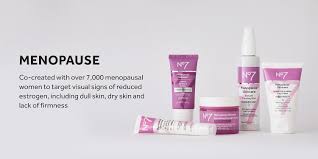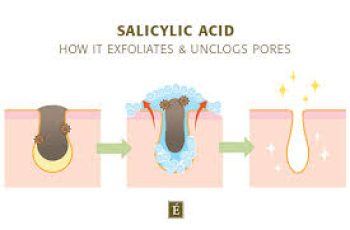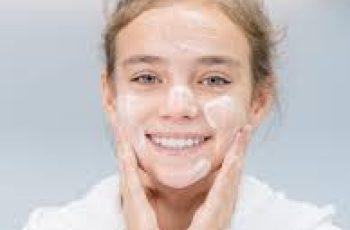
Menopause Skin Care
Menopause heralds a new stage in a woman’s life, accompanied by many changes throughout the body, including the skin. My patients often complain of hair loss, acne, sun spots, dry skin and itching in the premenopausal, menopausal and postmenopausal years. As ovarian function wanes, declining hormonal levels significantly impact skin health and appearance. Understanding the science behind these cutaneous changes can help design the perfect skin care routine for maturing skin during the menopausal transition. The key is to protect the skin from aging with the best menopause skin care.
I like to match my patient’s menopausal skin care routine to their Baumann Skin Type. I can d the same for you if you take the skin care routine quiz to find the best skin care products to treat your menopausal skin.
Menopause Skin Aging
Menopause is defined as the permanent cessation of menstrual cycles, marking the end of fertility, and occurs naturally between ages 45-55 years as the ovaries stop producing eggs and estrogen/progesterone levels decline (2). Many skin changes occur during this time such as wrinkles, skin thinning, and loose, sagging skin. Skin aging increases during menopause.
Update your routine with menopause skin care by taking the quiz as soon as you start having insomnia, hot flashes and forgetfulness which are signs of menopause.
The skin type quiz will help you find build a menopause skin care routine.
Skin Signs of Menopause
Thin, Fragile Skin
Estrogen promotes types I and III collagen production in fibroblasts. During menopause, estrogen levels drop dramatically, slowing collagen synthesis. Studies demonstrate postmenopausal women lose 30% of skin collagen, mostly type I and III, within 5 years of beginning menopause (4,5). This thinning of the dermis leads to thin, fragile, wrinkled skin.
elastin decreases during menopause
Decreased Elasticity
Menopause is the time when skin begins to sag and lose firmness. Estrogen helps maintain elastin fibers that keep skin supple. With less estrogen, elastin breakdown occurs leading to sagging skin and jowls (6).
Dry Skin
Estrogen helps retain moisture in the epidermis. Declining estrogen causes skin dehydration due to increased transepidermal water loss (evaporation of water) from your skin. This is why you can get skin dryness and itching in menopause (5.7).
Pigmentation changes during menopause
Skin Pigmentation
Fluctuating melanocyte-stimulating hormones during menopause stimulate melanocytes to make melanin and can cause hyperpigmentation, and uneven skin tone. (6) This is why you may develop dark spots or sun spots on the skin during menopause.
The good news is that unless you take estrogen replacement medication, melasma tends to get better during menopause because it can be caused or worsened by estrogen.
Acne
Acne breakouts are common as shifting hormones and an increase of androgens trigger acne. Menopausal acne often manifests as pimples and cysts along the chin and jawline.
The best treatment for hormonal acne in menopause is the prescription anti-androgen medication called Winlevi (Clascoterone). Using this hormone blocking cream along your jawline and chin in combination with a retinoid can help prevent menopausal acne cysts.
Hormonal changes that affect skin
Hormonal Changes that Affect Skin
Estrogen
Declining estrogen during menopause correlates with reduced collagen types I and IV in the dermis and basement membrane. This leads to thinning of the skin, wrinkles, and reduced structural integrity.
Estradiol therapy can increase transforming growth factor-beta (TGF-β), which upregulates collagen production. Estrogen also increases tissue inhibitor of metalloproteinases (TIMPs), reducing deleterious matrix metalloproteinases (MMPs). Overall, estrogen replacement increases collagen types I and III content, skin thickness, elasticity and moisture content (1,5,7).
Progesterone
Decreased progesterone during menopause is associated with reduced production of skin surface lipids such as ceramides, cholesterol, and fatty acids. This leads to a compromised lipid barrier and leads to dry skin on the face.
When combined with estrogen therapy, progesterone increases skin surface lipids such as ceramides, cholesterol, and free fatty acids. This is thought to occur through stimulation of sebaceous gland activity and increased sebum production. One study found a 48% increase in skin surface lipids with replacement of progesterone plus estrogen versus estrogen alone (20,21).
Testosterone
Testosterone
Menopausal testosterone decline along with estrogen reduction leads to impaired stimulation of collagen production. Testosterone therapy combined with estrogen results in up to 48% higher skin collagen content compared to estrogen therapy alone. Testosterone is converted to estradiol via aromatase to activate estrogen receptors. However, testosterone combined with estrogen particularly increases type II collagen synthesis, which is not seen with estrogen alone (22,23)
Human Growth Hormone
Diminished HGH levels during menopause correlate with thinning of the dermis as cellular proliferation and extracellular matrix components are reduced. Supplementing with growth hormone can help increase skin thickness and collagen. (1)
Thyroid hormone
The active thyroid hormones triiodothyronine (T3) and thyroxine (T4) increase mitochondrial activity, ATP production, and antioxidant enzymes in dermal fibroblasts. At the molecular level, they upregulate collagen types I and III gene transcription, helping to thicken aged skin (1).
Decreased thyroid hormones during menopause reduce mitochondrial activity and collagen production in fibroblasts. This leads to skin thinning and fragility. T3 and T4 supplementation can help stimulate fibroblast activity and collagen synthesis (1,29,30)
Caring for pre and post menopausal skin
Pre and Post Menopausal Skin Care
Whether you are in premenopause, menopause, or post menopause, your skin care routine matters. Below in the Menopause skin care section I will discuss what I tell my patients about skin care products to use in pre menopause, menopause and post menopause. Basically- all 3 stages of menopause need the same skin care routine which should be matched to your Baumann Skin Type.
Here are tips I give my patients for improving their skin in menopause. Note that hormone replacement is not for everyone and should be discussed with your doctor, especially if you have a history in your family or self of breast, ovarian or uterine cancer.
Caring for Dry Menopausal Skin:
Use cleansers for your skin type
Add antioxidants to diet
Use retinoids if right for your skin type
Use rich barrier repair moisturizers
Exfoliate 2-3 times a week
Apply broad spectrum sunscreen daily
Drink adequate water
Consider topical estrogen for severe dryness
Provide attentive care during this transition and be consistent with your skin care routine.
With this approach, menopausal skin can maintain a healthy, vibrant youthful glow and texture- but you must use the right products for your Baumann Skin Type. There is much more to treating menopausal skin than using moisturizers and sunscreen.
Menopause Skin Care for Face
Not all menopausal skin is dry so make sure you take the quiz to see if you are dry or oily. (Most people guess incorrectly) Once you know if you are considered dry or oily in the Baumann Skin Typing System, you should choose your cleanser by your skin type. The cleansers below may be good for your skin, but it is better to take the quiz and let us tell you exactly which cleansers to choose.
Cleansers
Cleansers can make a huge difference in menopausal skin by depositing fatty acids on the skin and exfoliating. But make sure you shop by your Baumann Skin Type.
[[C02]]
Eye Creams and Serums
Face Creams
The best face cream to use for menopause should have antiaging ingredients. The right one for you depends upon which Baumann Skin Type you are. I recommend the products below but take the skin type quiz to be certain before you buy.
[[M05,M35]]
Serums for menopausal skin
Face Serums
Antioxidant serums such as Vitamin C serums and retinol serums are good for most skin types to help increase skin collagen lost during menopause. These may also help firm skin and prevent sagging.
[[T04,T11]]
Masks for Menopause
Wild Yams are a natural source of estrogen. This vegan mask is a natural way to plump up and hydrate menopausal skin. It also has caffeine which is an antioxidant, anti-inflammatory and helps reduce any facial puffiness.
This antiaging mask also helps stabilize your skin’s microbiome.
Sunscreens
Menopause Skin Care For Body
Body Wash
Stay away from soaps, bubble baths, and very foaming body washes that strip lipids from the skin and injure the skin barrier. These can make menopausal skin even drier.
Instead choose creamy body washes and follow with an oil or body cream.
[[C10]]
Body Creams
When estrogen levels drop, you need a barrier repair body cream and a body oil to help replenish skin lipids.
[[M06,M08]]
Menopause Supplements and Vitamins
Eating a healthy diet is so important when you are going through menopause. You can also look for antioxidant supplements with ingredients like green tea, polypodium leuctoomas, pomegranate, ascorbic acid, and resveratrol among many others.
[[SP06,SP11]]
Every product that you use in your skin care routine is important. They interact with each other so your skin care routine step order and how you layer the products affects how well they absorb and how effective they are.
Let us help you find the best skin care brands to treat your menopausal skin. You will be able to combine products from different medical grade brands into the perfect perimenopausal, menopausal or postmenopausal skin care routine.


